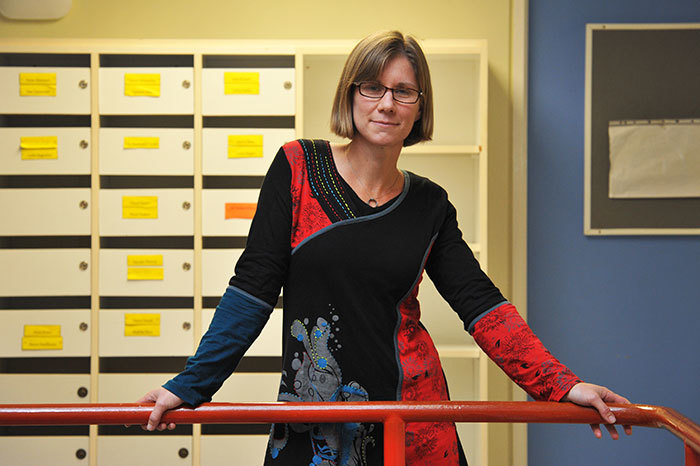The politics of rebellion
06 October 2014 | Story by Newsroom
Bekkersdal, Lwandle, Boitumelong, Sebokeng. Services and wages, land and housing, corruption and electricity.
As democracy fails to provide what was promised on paper, the post-1994 reality for most South Africans has seen a new wave of social protest; what South African Research Chair in Social Change at the University of Johannesburg Professor Peter Alexander calls the "rebellion of the poor".
It's fertile ground for Zuern, whose academic home is Sarah Lawrence College in New York. Now visiting professor in the Van Zyl Slabbert Chair in the Faculty of Humanities, Zuern is at UCT for a six-month stint ending in December.
Zuern's research interests encompass community protest and social movements in new democracies, as well as popular responses to poverty and inequality, and violence and the democratisation process.
The growth of social movements has been one of the hallmarks of modern politics in this country and she has contributed to an edited volume on the topic: Voices of Protest: Social movements in post-apartheid South Africa.
Circular journeys
The Columbia-trained scholar has been coming to South Africa for many years; first in 1994, just after the watershed democratic elections, and this time, fortuitously, in the 20th year after freedom.
In many senses, it's full circle in her South African journey.
While much has changed in the two decades after 1994; much has remained the same, says Zuern, proving just how difficult it is to govern a country, and how democracy has failed to meet the full expectations of the people.
That much is evident in the widespread and continuing social protests where communities have coalesced under the banner of common need. These protests also hit university campuses like Tshwane, where in September students rallied for greater financial support from the same government that entrenched their right to education.
While Zuern's doctorate focused on the decline of participatory democracy in South Africa's transition, her more recent work has examined the effects of globalisation and social inequality and how these relate to social movements in post-apartheid South Africa.
The broader issues around democracy in Africa have always interested her. In the late 1980s, she participated in the first US Study Abroad programme in Nigeria where she witnessed first-hand their democratisation struggles. She had intended to return for further research in the early 1990s but in November 1993, Sani Abacha came to power after a contested election and a coup.
"It was not a good time for me to be doing fieldwork," she says wryly.
Democracy on the ground
The following year she won a grant that brought her to South Africa where she worked for the Wits-Vaal Peace Secretariat, part of the National Peace Secretariat, created to monitor and reduce violence in the run-up to 1994 elections.
Zuern ran a series of interviews with peace monitors; people from the community clad in orange bibs whose job was to prevent violence between opposing groups.
It was an eye-opener.
"In my reading before I came, so much had been about the 'elite actors', Mandela, De Klerk ... There was so much violence going on, but when I started talking to the peace monitors, the scale of what was happening was so much greater than what had been covered either in the mainstream or academic press.
"Hearing what people on the ground said was more about democracy as a vehicle for social services; people wanted basic things to survive ... and people were driven into activism to secure the basics they needed to survive."
That was meant to be her last trip here, but Zuern was back in six months.
"That experience of people really wanting me to tell their stories encouraged me. I wanted to continue doing that kind of work."
Struggling for more than the right to vote
She returned in 1997 to conduct her dissertation research on civic organisations that had grown out of the 1980s; later she returned to research the new social movements that rose up in the late 1990s; these were organisations that challenged the way existing civic structures had simply become allies of the ANC '“ and then stopped speaking out.
"As a trained researcher, armed with an hypothesis, one of the amazing things about doing interviews is that if you're really listening to people, you have to rephrase your questions. You have to change your approach to what you're doing and that's sometimes hard in academia.
"So many arguments suggested the struggle was simply about democracy against apartheid. But in a context of severe economic inequality, democracy has lost its value for many. They struggled for something more than the right to vote."
Ordinary people's understandings of substantive democracy and their hopes, captured in Zuern's interviews over 15 years, formed the core of her 2011 book, The Politics of Necessity: Community organising and democracy in South Africa.
One reviewer described it as " ... timely, readable, and accessible, and important politically, empirically, and theoretically. It displays the indifference of some fledgling democracies to the needs of the poor, exposes the impoverishment of definitions of democracy that overlook this pattern, and shows the costs of these silences".
"So much of the literature on democratisation is about political and civil rights and so many of the people I was interviewing were talking about socio-economic rights on an equal footing with those rights," Zuern adds.
"And the framework is a challenge to much of the liberal theorisation."
The Open Society Foundation for South Africa provided a five-year grant to fund the series of Van Zyl Slabbert Visiting Professorships in the Departments of Political Science and Sociology between 2013 and 2018.
Story by Helen Swingler. Image by Michael Hammond.
 This work is licensed under a Creative Commons Attribution-NoDerivatives 4.0 International License.
This work is licensed under a Creative Commons Attribution-NoDerivatives 4.0 International License.
Please view the republishing articles page for more information.










